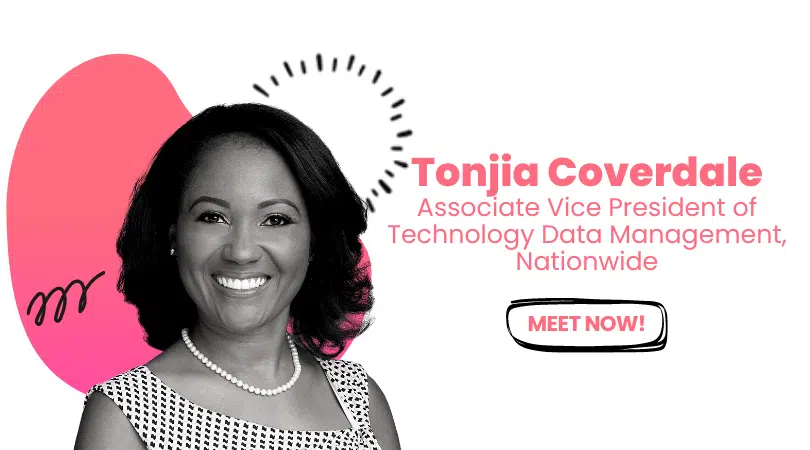Tonjia Coverdale

“You may not end up where you thought you were going, but you will always end up where you were meant to be.” This quote perfectly describes the journey of Dr. Tonjia Coverdale, a 26-year career technologist, educator, and problem solver. At the tender age of 7 years old, she thought she wanted to be a teacher. But after a chance conversation with her father, her career dreams changed. After sharing her teaching aspirations, he drove her to the largest classroom she’d ever seen, a lecture hall at the local university, to show her where professors worked. During their visit, her father sat in the front row and listened as his daughter began to teach him, and from that moment, Tonjia decided she wanted to be a professor.
But her path to academia was neither straight nor predestined. After college, she began her career as a developer at IBM. Then she moved on to become a solutions architect at a top-five consulting firm, where she merged a love of people and problem-solving with her technology background. But academia was still calling her, so she returned to school to earn a Ph.D. in Information Science and Systems and became a full-time professor. Tonjia loved higher education and thought that would be where she would stay, but her career trajectory was far from settled. She continued to be open to new conversations and challenges in both the private and public sectors, and today is the Associate Vice President of Technology Data Management at Nationwide.
We sat down with Tonjia to learn more about her unusual path to Nationwide and why she believes being open to conversations with others can help you grow and lead you to amazing places in your journey.
“I always say technology found me. It chose me. I was a math major when I entered college because I loved solving problems. But when I got to school and looked at the four-year program of study, I realized there were a lot of math classes. And I was not quite sure I liked math that much. So I decided to change my major.
I actually chose my major by flipping through the catalog. I want to point out that I was a first-generation college student because, clearly, I would not recommend anybody to do this. Luckily, it worked out for me. And so, I just chose a major based on what I thought at the time was a balanced curriculum. When I looked at information systems, which is more business-focused, I liked that there was accounting, finance, marketing, management, science, and math. I felt like this curriculum touched on so many things. And so I chose it just because of that.
But here’s the crazy part. Two years go by, and students usually don’t get into their major classes until junior year. I walked into my first Information Systems 100-level class, which was in a computer lab, and I didn’t know why. The professor proceeded to tell us to turn on the computer, and all this time, I had never used a computer. I was 18 years old and had a word processor, and I thought, ‘Oh, my gosh! I have to figure this out because my scholarship expires next year, and I’m not going back home.’
And so that’s how technology chose me. By the end of that year, I was a full-time developer at IBM. So, I definitely figured it out.”
“I have always wanted to be a professor. In fact, when I went to college, I was going to be a math professor, which is why I had thought I would major in the subject. I went back to get my Ph.D. because the chair from my alma mater called me and said, ‘We’re starting our inaugural class for a Ph.D. in business administration, and we’re going to have an information systems component. We want you to be in the first cohort because we remember that you said you wanted your Ph.D. so you could be a professor.’
That’s why I left tech and went back to school. But I eventually found that I could combine my two loves because I had grown to love technology. It was fun, and it was problem-solving. But now, I would also get to teach.”
“Oh, I definitely had a big surprise. I would have never thought that I would be working at Nationwide. After so many years in higher education, I never had any thoughts about going back to industry.
Then, a recruiter reached out to me, and I will always have a conversation because I think you can learn so much about yourself and the world simply by talking to people. And I was open to that conversation even though I fought the idea of leaving higher education.
But what I was surprised about was how with each interview, each panel, and each person I met at Nationwide, I fell in love with the culture even though it seemed to me at that time Nationwide was just an insurance company, which I know it is so much more than that now.
But at that time, I was surprised at how much the company aligned with my personal mission and vision, and purpose. So I was surprised at that, and it reiterated to me just to be open to opportunities when I went into the interview.”
“Have the conversation. Always have the conversation. Sometimes you only know what you know, and there’s so much more to learn. And if an opportunity comes your way, nine times out of 10, it’s because that opportunity is something that you need, that is being willed to you to grow and expand. But in your short-sightedness, you can cut it off by having a predetermined path for yourself. My path has been so meandering, and I can tell you at every bend, every turn, I grew exponentially.
And I definitely would just say, have the conversation and be open to everything that comes your way because, in my case, I was surprised by how much I love this company.
I went into the interview thinking, ‘It’s OK. I’ll talk to them. And by the end of the recruiting process, I thought, “Oh my gosh, I hope they pick me. I’m praying. Please pick me. I want to come here.’
In the last few years with Nationwide, I’ve just learned so much about myself, the world, and leadership. I’ve become a stronger leader. My voice has become more amplified. I have become more self-assured and confident in a space I thought I didn’t know.”
Whether it was the earliest conversations with her father about what she wanted to be when she grew up, the chair from her alma mater calling to suggest a Ph.D. program, or a conversation with a recruiter about an opportunity she wasn’t even looking for, Tonjia Coverdale has never regretted being open to discourse with others. And through them all, she may not have ended up where she thought but where she was meant to be.




